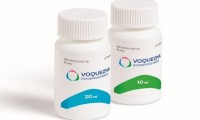-
FDA warns of hidden drug ingredients in Dr Ergin’s SugarMD
- Source: drugdu
- 94
- November 9, 2023
-
FDA extends pandemic-era policy allowing certain device, production changes without prior approval
- Source: drugdu
- 133
- November 5, 2023
-
Merck’s Keytruda combination granted FDA approval for biliary tract cancer
- Source: drugdu
- 97
- November 4, 2023
-
Phathom passes acid tests, capturing 2 FDA approvals for Voquezna after impurity setback
- Source: drugdu
- 100
- November 4, 2023
-
FDA warning letter accuses Wavi of selling unapproved neurological device
- Source: drugdu
- 220
- November 3, 2023
-
FDA Grants Fast Track Designation to Sellas Life Sciences’ SLS009 for Lymphoma
- Source: drugdu
- 105
- November 3, 2023
-
Amgen scores FDA approval for Stelara biosimilar
- Source: drugdu
- 99
- November 3, 2023
-
Merck’s Keytruda nabs FDA nod in biliary tract cancer, catching up with AstraZeneca’s Imfinzi
- Source: drugdu
- 101
- November 3, 2023
-
FDA posts updated safety data on Bayer’s Essure, notes progress on improving study
- Source: drugdu
- 116
- November 2, 2023
-
FDA approves UCB’s inflammatory disease drug Bimzelx for plaque psoriasis
- Source: drugdu
- 137
- October 20, 2023
your submission has already been received.
OK
Subscribe
Please enter a valid Email address!
Submit
The most relevant industry news & insight will be sent to you every two weeks.













